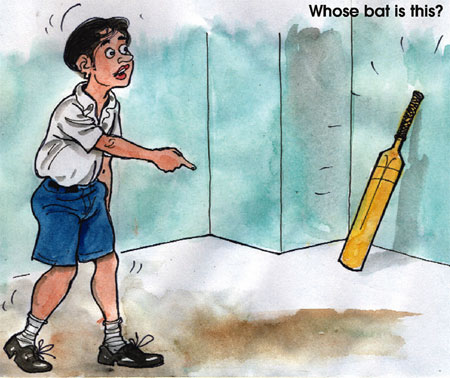|

by R. S. Karunaratne
Role of ‘whose’ in sentence structure
We use a relative clause with ‘whose’ to describe a person or thing
in the main clause that owns or is related to a person or thing in the
relative clause.
This is the man whose car was stolen last night.

Here ‘This is the man’ is the main clause; ‘whose car was stolen last
night’ is the relative clause.
More examples:
There was a picture of a baby elephant whose trunk had been partly
blown off.
We used to stay in a hotel whose meals were hopeless.
Do you know the boy whose father is a carpenter?
Is that the woman whose salary has been stopped?
I know a man whose job is to collect garbage.
A relative clause with ‘whose’ has a finite verb which should agree with
its subject.
We know the parents whose child is exceptionally brilliant.
Do you know the teacher whose students never fail examinations?
We must not condemn people whose religious beliefs are different from
ours.
I used to correspond with film-stars whose films I enjoyed.
We live in a country whose population is increasing.
Merryl works in a factory whose manager is a strict disciplinarian.
Robbers broke into a house whose occupants were holidaying in a
foreign country.
The word ‘whose’ shows ownership or connection. It takes the place of
‘his, her, its’ or ‘their.’
I’m worried about the girl whose mother is working as a housemaid in
the Middle East.
He is a person whose courage we admire.
They live in a house whose roof is crumbling down.
I taught a child whose father was one of my classmates.
Anuradhapura is an ancient city whose historical sites attract tourists.
In questions we use ‘whose’ to ask about which person owns or is
responsible for something.
Whose pen is this?
Whose bat is this?
Whose shoes are these?
Whose houses are these?
Whose book is this?
[Activity]
Circle the numbers where ‘B’ sentence means the same as the ‘A’
sentence. Check your answers with the key.
1. (A) I’m reading a book whose print is clear.
(B) I’m reading a book. Its print is clear.
2. (A)The college has students whose teachers are famous.
(B) The college has students. They and their teachers are famous.
3. (A) I know a man whose hair is dyed black.
(B) I know a man. His hair is dyed black.

4. (A) Your friend was one of the candidates whose application was
rejected.
(B) Your friend was one of the candidates. His application was rejected.
5. (A) I met a former classmate whose name I couldn’t remember.
(B) I met a former classmate. I couldn’t remember his name.
6. (A) I always buy goods whose quality is guaranteed.
(B) I always buy goods. Their quality is guaranteed.
7. (A) I’ll visit the patient whose son is in my class.
(B) I’ll visit the patient. Her son is in my class.
8. (A) Children love reading about Tarzan whose adventures they find
exciting.
(B) Children love reading about Tarzan. They find his adventures
exciting.
9. (A) My father is a magician whose performances entertained the
audience.
(b) My father is a magician. His performances entertained the audience.
10. (A) I work for a company whose chairman is an accountant.
(B) I work for a company. Its chairman is an accountant.
Key: Except No. 2, all the other ‘A’ and ‘B’ sentences have the
same meaning.
English proverbs explained
A proverb is a popular short saying, with words of advice or warning.
Most proverbs reflect folk wisdom.
Here are some popular proverbs for your knowledge bank.
1. Every man has the defects of his own virtues
Everybody has both good and bad qualities.
2. Every man is his own worst enemy
When a person does something he knows that it is bad. However, he does
it because it is in his character to do so.
3. Every medal has two sides
Everything has two sides. And so has every argument.
4. Every oak must be an acorn
We should not be ashamed by our ‘smallness’ because everything has a
small beginning.
5. Every why has a wherefore
There is a reason for everything
6. Everybody’s business is nobody’s business
When nobody is responsible for doing something, nobody does it.
7. Everyone to his taste
We all have our likes and dislikes. That is quite human to have such
differences.
8. Everything comes to him who waits
Those who try to achieve certain things in life patiently finally get
them.
9. Everything must have a beginning
As all beginnings are necessarily small, everything has a beginning.
10. Evil be to him who evil thinks
If you think of evil things, dishonour will come to you.
11. Example is better than precept
It is always better to set an example than giving advice.
12. Exchange is no robbery
This is an excuse given by those who have had the advantage of an unfair
exchange.
13. Expectation is better than realisation
When we have gained an object, very often it turns out to be a
disappointment.
14. Experience is the mother of wisdom
Wisdom comes only through experience. In other words, we learn by our
mistakes.
15. An eye for an eye, and a tooth for a tooth.
This is the doctrine of revenge. Jesus Christ condemned it in his Sermon
on the Mount: “... whoever shall smite thee on thy right cheek, turn to
him the other also.”
Starters:
Use of ‘every,’ ‘everybody’ and ‘everything’
Although the words ‘every,’ ‘everybody’ and ‘everything’ look simple,
there are certain grammatical rules governing their usage.
Every
As a determiner, ‘every’ is used when we refer to all the members of
a group of three or more.
The police questioned every employee of the museum about the recent
theft.

The Sunday Observer is published every Sunday.
Most banks are open every day except Saturday and Sunday.
Where are you going every night?
Every time I come here you are in a bad mood.
Every house in the city was searched by the police.
Note: ‘Every’ is always followed by a singular noun.
Mary has been to every city in Canada.
You look different every time I see you.
We use a singular verb after ‘every’.
Every house in the village has electricity.
Every country has a national flag.
When we use ‘every day’, we mean ‘on all days.’
We read newspapers every day.
Nethmi watches television every evening.
When we use ‘all day’ we mean ‘the complete day from beginning to end’.
It rained all day yesterday.
Don’t waste time watching television all day.
‘Everybody’ and ‘everyone’ mean the same. They are used to refer to
people.
Everybody stood up when the national flag was hoisted.
Everyone in his family fell ill.
I know everybody working there.
If everyone does his role well, the play will be successful.
‘Everything’ refers to things.
I bought everything I needed for the trip.
Is everything ready?
Everything will be over before midnight.
Robbers have taken everything.
We use ‘everywhere’ to refer to places.
I looked for you everywhere.
Gypsies travel everywhere.
Coconut trees are not found everywhere.
[Activity]
Fill in the blanks with ‘everybody, everything’ or ‘everywhere’.
Check your answers with the key.
1. ................ wants to lead a happy life.
2. He knows ................ about printing.
3. I like this class because ....................... is friendly.
4. Very rarely we find a hotel where .................. is clean.
5. Raja goes .................... on his bicycle.
6. Is ................. hungry?
7. There are books and newspapers ................... in his house.
8. You’re right. .................. you said is true.
9. ................... knows me.
10. Is ................... ready for the meeting?
[Key]
1. Everybody, 2. everything, 3. everybody, 4. everything, 5.
everywhere, 6. everybody, 7. everywhere, 8. Everything, 9. Everybody,
10. everything
Irregular verbs
Irregular verbs have different forms in the past tense and past
participle. Beginners will have to make an effort to remember them.
Here’s a quiz on irregular verbs. Write the past tense and past
participle of the verbs given. Check your answers with the key.
Present Past Past participle
1. shrink ............ .................
2. shut ............ .................
3. sing ............ .................
4. sink ............ .................
5. sit ............ .................
6. slay ............ .................
7. sleep ............ .................
8. slide ............ .................
9. sling ............ .................
10. slink ............ .................
11. slit ............ .................
12. smell ............ .................
13. sow ............ .................
14. speak ............ .................
15. speed ............ .................
16. spell ............ .................
17. spend ............ .................
18. spill ............ .................
19. spin ............ .................
20. spit ............ .................
21. spin ............ .................
22. split ............ .................
23. spoil ............ .................
24. spread ............ .................
25. spring ............ .................
26. stand ............ .................
27. steal ............ .................
28. stick ............ .................
29 sting ............ .................
30. stink ............ .................
31. stride ............ .................
32. strike ............ .................
33. string ............ .................
34. strive ............ .................
35. swear ............ .................
36. sweep ............ .................
37. swell ............ .................
38. swim ............ .................
39. swing ............ .................
40. take ............. ..................
41. teach ............. ..................
42. tear ............. ..................
43. tell ............. ..................
44. think ............. ..................
45. throw ............. ..................
46. thrust ............. ..................
47. tread ............. ..................
48. undercut ............. ..................
49. undergo ............. ..................
50. understand............. ..................
51. undertake ............. ..................
52. undo ............. ..................
53. unwind ............. ..................
54. uphold ............. ..................
55. upset ............. ..................
56. wake ............. ..................
57. wear ............. ..................
58. weave ............. ..................
59. weep ............. ..................
60. wet ............. ..................
61. win ............. ..................
62. wind ............. ..................
63. withdraw ............. ..................
64. withhold ............. ..................
65. withstand ............. ..................
66. wring ............. ..................
67. write ............. ..................
Key:
1. shrank, shrunk, 2. shut, shut, 3. sang, sung, 4. sank, sunk, 5.
sat, sat, 6. slew, slain, 7. slept, slept, 8. slid, slid, 9. slung,
slung, 10. slunk, slunk, 11. slit, slit, 12. smelled, smelled / smelt,
smelt, 13. sowed, sown / sowed, 14. spoke, spoken, 15. sped, sped /
speeded, speeded, 16. spelled, spelled / spelt, spelt, 17. spent, spent,
18. spilled, spilled / spilt, spilt, 19. spun, spun, 20. spat, spat /
spit, spit, 21. spun, spun, 22. spilt, spilt, 23. spoiled, spoiled /
spoilt, spoilt, 24. spread, spread, 25. sprang, sprung, 26. stood,
stood, 27. stole, stolen, 28. stuck, stuck, 29. stung, stung, 30. stank,
stunk, 31. strode, strode, 32. struck, struck, 33. strung, strung, 34.
strove, striven / strived, strived, 35. swore, sworn, 36. swept, swept,
37. swelled, swollen / swelled, 38. swam, swum, 39. swung, swung, 40.
took, taken, 41. taught, taught, 42. tore, torn, 43. told, told, 44.
thought, thought, 45. threw, thrown, 46. thrust, thrust, 47. trod,
trodden, 48. undercut, undercut, 49. underwent, undergone, 50.
understood, understood, 51. undertook, undertook, 52. undid, undone, 53.
unwound, unwound, 54. upheld, upheld, 55. upset, upset, 56. woke, woken,
57. wore, worn, 58. wove, woven / weaved, weaved, 59. wept, wept, 60.
wet, wet / wetted, wetted, 61. won, won, 62, wound, wound, 63. withdrew,
withdrawn, 64. withheld, withheld, 65. withstood, withstood, 66. wrung,
wrung, 67. wrote, written |


